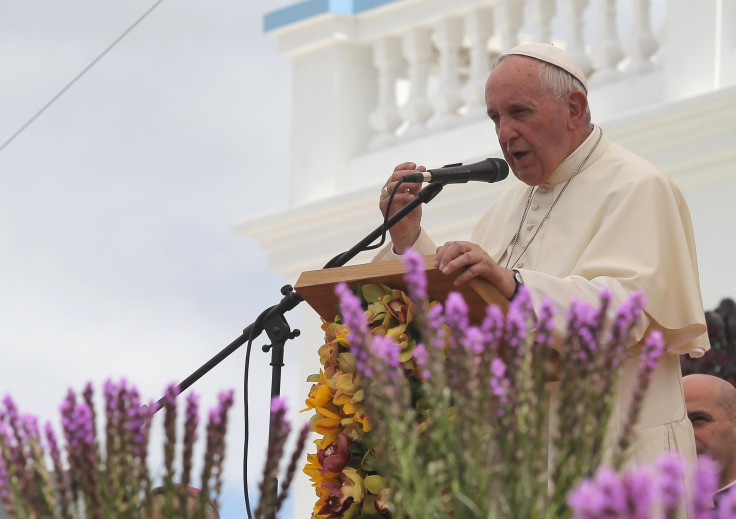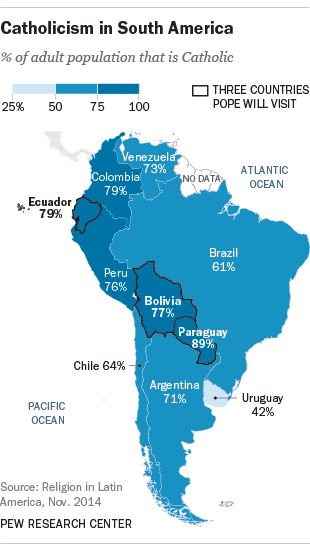Pope’s South America Trip Aims To Champion Poor, Reclaim Those Drifting From The Faith

Pope Francis is known as the "pope of the poor" and he's living up to that moniker on his tour of Latin America, where he is calling strayed Catholics back to the church with a message of hope and solidarity with those suffering from bitter poverty.
After speaking to 1.5 million Ecuadorians on the first leg of his three-country pilgrimage to South America, Pope Francis flew to Bolivia on Wednesday to continue what many are calling the Argentine-born pontiff’s “homecoming tour.” The theme of his visit in Ecuador, where he preached the importance of championing the poor and the environment, will carry on in Bolivia and later, Paraguay. It’s part of a larger strategy, experts say, to drive drifting Catholics back into the fold and echo the themes of social justice that have been a benchmark of Francis’ papacy.
It’s no coincidence that the pope’s eight-day trip to the region focuses on three of the most underdeveloped countries in Latin America. “He’s purposefully going to some of the poorest countries in Latin America, with higher proportions of indigenous populations,” said Peter Casarella, a professor of theology at Notre Dame who has also researched faith in Latin America. “He’s reaching out to bring across a message of inclusion of the poor.”
But, adds Casarella, Pope Francis is also aware of the changing dynamics of faith in South America -- and his trip is a symbolic effort to urge the masses to reconnect with their faith. While South America is home to 425 million Catholics, or 40 percent of the world’s Catholic population, according to Pew, it’s also losing a sizable amount of Catholics to other belief systems.
'Francis Effect?'
“In Latin America, there are two dynamics: cultural Catholicism alongside the forces of secularization, globalization, and urbanization. Young people are facing a completely different world,” said Casarella. “The pope is very savvy. He’s well aware of the challenges the youth face.”
Tom Groom, a professor of theology and director of the Church in the 21st Century Center at Boston College, says that the pope’s presence may in a small way counter the fact that there aren’t enough priests to serve the population in Latin America. “It’s not rocket science why the church is losing ground there. I met one priest who served 22 villages,” said Groom.

"Soon we will find out if there is a 'Francis effect' in his native region in terms of Mass attendance and participation in church life," Andrew Chesnut, an expert on Catholicism and religion in Latin America, told CNN.
But he’s not just there to connect with the public. Any foreign papal visit includes meetings with heads of state, and this one is no exception. What is notable, experts say, is how the pope has managed to sound social justice themes that overlap traditionally leftist leaders in South America who otherwise have been at odds with the church.
Papal Politics
In Bolivia, Pope Francis is expected to meet with President Evo Morales, a leftist leader who has had a rocky relationship with the Catholic church. Since taking power in 2006, Morales expunged Bibles and crosses from the presidential palace and ushered in a new constitution that declared the Catholic-majority country a secular state. But since Pope Francis became head of the Catholic church in 2013, Morales has met with him several times and seems to regard him fondly.
At a school inauguration in Chapare, Morales recently said, "The truth is he and I coincide enormously in politics, the social and the economic."
In Ecuador, President Rafael Correa, also known for leftist policies that focused on poverty reduction, gave a public speech before the pope in which Correa shared Pope Francis’ warnings against the world’s “perverse” economic system. After Correa’s speech, Pope Francis thanked Correa, adding, “You’ve cited me too much.”
“The pope has made inclusion of the poor in society a hallmark of his papacy,” said Casarella. “There’s an overlap, a sense of common vision between these leaders.”
But that overlap doesn’t mean the pope has kept quiet on issues where the Church and leaders like Morales and Correa are at odds, said Groom. Correa’s policies on drilling for oil and mining Amazon forests have incensed environmentalists, and the Pope spoke forcefully in Ecuador on the importance of preserving the country’s resources. It’s expected that he will continue sounding similar themes in Bolivia.
"The tapping of natural resources, which are so abundant in Ecuador, must not be concerned with short-term benefits," said Pope Francis in his final speech in the country. "We received this world as an inheritance from past generations, but also as a loan from future generations, to whom we will have to return it!”
© Copyright IBTimes 2024. All rights reserved.





















